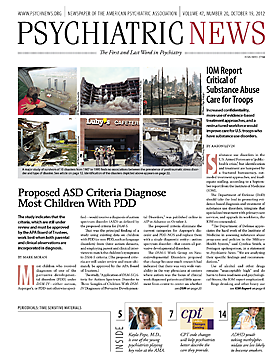If the progress made in 2012 is any indication, the availability of rapid-acting antidepressants may be only steps away.
It’s been little more than a decade since researchers at the Connecticut Mental Health Center reported the results of the first trial to assess the treatment effects of a single dose of an N-methyl-D-aspartate (NMDA) receptor antagonist—ketamine hydrochloride—in patients with depression. In that study, subjects with depression saw significant improvement in depressive symptoms within 72 hours after a ketamine infusion, as measured by the 25-item Hamilton Depression Rating Scale, suggesting a potential role for NMDA receptor-modulating drugs in the treatment of depression.
Scientists working at the National Institute of Mental Health (NIMH) have focused this year on elucidating that role, with encouraging results. Carlos Zarate Jr., M.D., is the chief of experimental therapeutics in the Mood and Anxiety Disorders Program at NIMH and a clinical professor of psychiatry at George Washington University. In the online January 31 Biological Psychiatry, he and his colleagues reported results of their study of ketamine’s effect on patients with bipolar depression, showing that those who received a single ketamine infusion experienced a rapid and robust antidepressant response. Even more exciting was their unexpected finding that ketamine rapidly improved suicidal ideation in these patients.
Then in Biological Psychiatry online April 21, Zarate and his colleagues described results of a study that examined not just for whom such drugs have a therapeutic effect, but how the drugs appear to work.
They gave 20 drug-free patients with major depressive disorder a single, open-label intravenous infusion of ketamine. They performed magnetoencephalographic recordings three days before and approximately 6.5 hours after the infusion, monitoring spontaneous activity while the subjects were at rest, as well as activity evoked by passive tactile stimulation to the left and right index fingers.
They already knew that by blocking NMDA receptors, ketamine causes an increase in spontaneous electrical signals in a particular frequency range in the brain’s cortex. Hours after ketamine administration—in the time-frame in which ketamine relieves depression—spontaneous electrical activity in people at rest is the same, regardless of whether their depression lifts.
But electrical activity evoked by stimulating a finger was different in the two groups. Those who responded to ketamine showed an increased response to the finger stimulation, a greater excitability of the neurons in the somatosensory cortex. Such a change in excitability is likely to result, not from the immediate effects of blocking the receptor, but from other processes downstream, in the cascade of effects set in motion by NMDA blockade, said the researchers. Evidence points to changes in another type of glutamate receptor, the AMPA receptor, raising questions about whether the blocking of NMDA receptors is even necessary for ketamine’s antidepressant effect.
If NMDA blockade is just a trigger, then targeting AMPA receptors may prove a more direct way to effect a lifting of depression.
“Our findings identify the first cortical marker of the rapid antidepressant effects of ketamine, and they are consistent with the hypothesis that enhanced non-NMDA-receptor-mediated glutamatergic neurotransmission through synaptic potentiation is central to the mechanism of action of ketamine,” they wrote.
In addition, Zarate and colleagues published results of their analysis of ketamine metabolites online April 18 in Biological Psychiatry, noting that concentrations of some metabolites were related to nonresponse to ketamine in bipolar depression patients.
“We are investigating ketamine in multiple ways—studying genes, gene expression, synapses, cells, circuits, and symptoms with neuroimaging, genetics, electrophysiological measures, and other techniques,” explained Zarate. “These studies hold hope for predicting the likelihood of response and for gaining insights into mechanisms of action.”

An abstract of “Replication of Ketamine’s Antidepressant Efficacy in Bipolar Depression: A Randomized, Controlled Add-On Trial” is posted at www.ncbi.nlm.nih.gov/pubmed/22297150. An abstract of “Relationship of Ketamine’s Plasma Metabolites With Response, Diagnosis, and Side Effects in Major Depression” is posted at www.ncbi.nlm.nih.gov/pubmed/22516044. An abstract of “Synaptic Potentiation is Critical for Rapid Antidepressant Response to Ketamine in Treatment-Resistant Major Depression” is posted at www.ncbi.nlm.nih.gov/pubmed/22521148. 

